This time it’s BU’s Colby Cohen who hits the post on a rocket from the point.A bad turnover in the Miami zone requires a nice bal-out save by Reichard and we’re still tied 1-1 with 4:37 to go in the second period.
Almost
On the their next shift after scoring, Miami almost does it again. Justin Mercier beats Millan five-hole from a tight angle, but the puck clangs off the post.
BU takes another penalty right after but the Terrriers kill it off. 1-1 with 14:36 to go in the second.
Miami Kicks off the Second With a Bang
After killing off a BU power play, The RedHawks tie the game 2:01 into the second period. After a scramble in front, Gary Steffes slams in a rebound.
The goal is under review. Was Andy Miele in the crease? It looked like he was, but didn’t interfere with BU goaltender Kieran Millan. The goal stands.
After One…
– BU leads 1-0.
– The period was fairly even in terms of play. Miami was aided by three power plays, while BU dominated for one short stretch, and scored as a result.
– BU will have 1:48 of power play to work with to open the second.
– There are 18,000 people here and 17,000 of them are wearing red.
BU on Top
At 15:15 of the first period, the Terriers are on the board. Miami goaltender Cody Reichard got a glove on David Warsofsky’s shot from the point, but the rebound lay in the crease and was poked in by Chris Connolly, his 10th of the season.
Seven Minutes In
Aided by two power plays, Miami leads BU in shots 4-1 as both teams feel each other out in the early going. Miami’s first power play was excellent, but the RedHawks struggled to gain the BU blueline in their second attempt.
Title Town
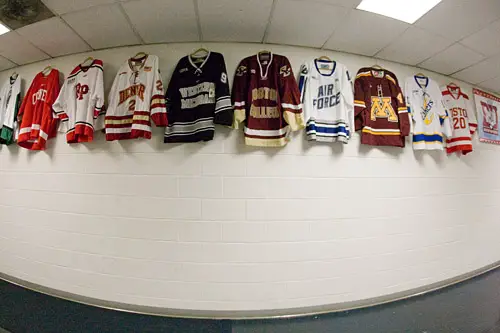
Tonight the 2008-09 season comes to an end. Prediction: a team wearing red will be hoisting the trophy tonight. Who will be the hero? Will we need more than 60 minutes to decide things? Can this game match up to the incredible tournament we’ve had so far?
Stay tuned.
From The Shadows
The nation’s capital exemplifies a common duality between hockey and pro hockey. Like April’s cherry trees, D.C.’s interest in the professional team, the Washington Capitals, has been blooming all over, but the region’s hockey awareness tends to stop at the letters N.H.L.
That presented a challenge to the Greater Washington Sports Alliance (GWSA) and the NCAA in marketing the Frozen Four.
The nation’s seat-of-government isn’t a traditional hockey market, despite its reasonably northeastern location. Its coldest month of the year, January, averages a balmy 34 degrees, and natural sustained freezes are extremely rare. Therefore, the more frigid traditions associated with frozen ponds and backyard rinks are unknown so close to the Mason-Dixon Line.
On the pro side of things, the Caps were borne of the NHL’s greatest expansion era, commencing play in 1974. The team was solid and made frequent playoff pushes through the 1980s and ’90s, but while their Alexander Ovechkin-led resurgence vaulted them into the playoffs last year, they had missed the postseason each of the previous five years.
Youth hockey has taken hold in the wake of the Caps’ reawakening, with nearly a dozen year-round rinks in the greater Washington area. Maryland, Navy, Georgetown, Virginia, Virginia Tech, American, George Mason and George Washington, among others, each boast ACHA club hockey teams, but Princeton is the nearest D-I program.
It’s not surprising, therefore, that recognition of college hockey’s ultimate event differs greatly, depending on who and where you inquire.
Signage for the event was heavy on the block of the Verizon Center, with lightpost banners, scrolling marquees and multitudes of advertising and merchandise on display in the arena’s street-front windows, but apart from bars and restaurants welcoming NCAA hockey business with chalkboard signs on the street, there was little to be seen as few as a dozen yards from the venue. The Washington Mall appeared devoid of flags, signs or banners, despite being a short half-dozen blocks from the arena.
On the other hand, as far away as northern Virginia there was Frozen Four merchandise available at the Kettler Capitals Iceplex, the practice site and headquarters for the NHL organization. While a hotel concierge a half-mile from the games professed to have no knowledge whatsoever about the Frozen Four, the college-aged attendant at the Iceplex on Friday knew all about it, correctly naming the participants and even Thursday night’s winners. Perhaps it helped that one of his best friends plays for Rensselaer.
The marketing strategy, according to GWSA vice president Chris Browne, was primarily hockey-centric. The local focus was on hitting area rinks and youth organizations, getting the word out that the D.C.’s first-ever NCAA championship event was going on and that tickets were available. From an attendance perspective, most Frozen Fours are tap-in: only 2,500 tickets were made available for walk-up or local consumption, with the rest going to the participating schools and other NCAA member institutions. Apart from selling those few seats, Browne & Co. were mostly interested in generating awareness of the event.
Side events organized by the GWSA included the annual skills competition on Friday night, but also a youth clinic at the Iceplex on Saturday morning and an open-skate on the Verizon’s sheet early that afternoon; both were very well attended.
So what’s to be made of this quirky little hockey community? It may not be the most overwhelmingly appreciative and understanding site in the Frozen Four’s illustrious history, but the NCAA looking for a return trip to the District would be, well, a capital idea.
Thoughts on a Fun Friday at the Frozen
– Matt Gilroy: No surprise. He was the favorite in my book and it’s a great success story.
– Missy Elumba: An inspiring young woman who turned adversity into a mission to help others.
– The skills competition continues to grow on me. As USCHO’s “Atlantic Hockey Guy” it was nice to see the AHA players perform so well. Zach McKelvie from Army (who has a brother here with Bemidji), Air Force’s Greg Flynn (who has a brother maybe here with Minnesota) and RIT’s Jesse Newman (who has a brother who’s not on a college hockey roster and I have no idea if he’s here) all did a great job.
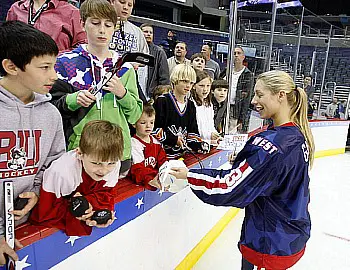
– I’m trying to figure out why Flynn was on the West roster for the Skills Challenge but teammate Jacques Lamoureux was named an All-American from the East. Congrats in both cases.
– Favorite line of the night from (of course) Air Force coach Frank Serratore, who was behind the losing West bench for the Skills Challenge: “We got outcoached,” he said. “We didn’t gel in time.”
—Thanks to Theresa Spisak and Melissa Wade
Best For Last: Boston University Rallies To National Title
In one of the most incredible comebacks in NCAA tournament history, Boston University defeated Miami 4-3 on a Colby Cohen goal at 11:47 of overtime to capture the school’s fifth national title and first since 1995.
Cohen’s shot from above the left faceoff circle deflected off Miami’s Kevin Roeder, popped in the air and looped over goaltender Cody Reichard (28 saves) to send the BU faithful who were part of the capacity crowd of 18,512 at the Verizon Center into pandemonium.
The game was sent to overtime with one of the most dramatic endings to regulation in tournament history.
After Miami broke a 1-1 deadlock on a Tommy Wingels goal with 7:29 remaining in the third period and Trent Vogelhuber buried an insurance marker with 4:08 left, the RedHawks looked to be headed to their first-ever national title.
That was until BU scored two extra-attacker goals in the final minute of regulation to send this year’s national title game to overtime.
BU coach Jack Parker pulled goaltender Kieran Millan with 3:23 remaining in regulation and Zach Cohen banged a rebound home at the left post with 59.5 seconds remaining to draw the Terriers within a goal.
That set up Nick Bonino, who one-timed a pass at the right faceoff dot past Reichard with 17.4 seconds to play to force the extra session.
BU took an early lead on a first-period Chris Connolly goal at 15:15. Defenseman David Warsofsky sent a puck on net from the left point that hit Miami’s Alden Hirschfeld and deflected towards Reichard. Before Reichard could cover the puck, Connolly got enough of it to push it into the net.
Miami had plenty of chances of its own in the first, particularly on three power plays, but was unable to solve Millan (29 saves).
Through 20 minutes, Miami held a 10-9 advantage in shots.
A Miami penalty late in the first put the Terriers on the power play to start the second. BU’s Chris Higgins had two point-blank opportunities at open nets, fanning on one and redirecting another off the side of the net.
Once the RedHawks killed the BU power play, they used the momentum to get on the board and draw even at 2:01. Gary Steffes buried a loose puck in a scrum in front of Millan for his 11th goal of the season, sending the Miami faithful into a frenzy.
Both clubs had quality chances throughout the remainder of the period. Miami’s Justin Mercier was stopped by Millan on a 2-on-0 at 10:45. Colby Cohen then rang a blast from the left point off the post with six minutes remaining to send the game to the third tied.
That was when Miami was at its best. Wingels’ goal came after Carter Camper made a dangling move at the blueline and fired a low shot on Millan. Wingels was Johnny-on-the-spot, burying the rebound with 7:29 left.
After Miami failed on the power play for the seventh time in the game, Vogelhuber picked the perfect time to score his second goal of the season, firing a hard wrist shot inside the right post.
That, though, only set up BU’s last-minute heroics that forced the overtime.
Power Outage
During the postseason, coaches often spout platitudes about how goaltending and special teams make the difference between winning and losing in the fierce battles of the playoffs.
What is so interesting about this year’s championship game is that ultimately, neither goaltending nor the power play made as big an impact.
While Boston University scored two-extra attacker goals (technically not power plays), what might have made the biggest difference in the game was the lack of a power play for Miami, and BU’s ability to repeatedly kill penalties.
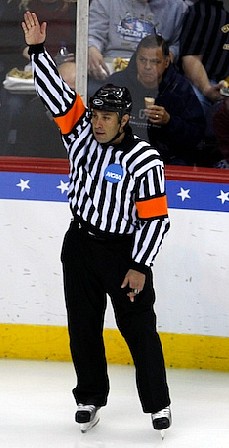
BU’s Kieran Millan made several good stops, but none on which he really robbed the RedHawks. Miami’s Cody Reichard was much the same; in fact, both teams rang shots off the post in the second period. Reichard finished with 28 saves, Millan 29.
For all the focus on BU’s improbable comeback and Miami being so close the title, the RedHawks probably lost the game by going 0-for-7 on the power play. BU took a series of penalties including two in the third, one after Miami had taken the lead on Tommy Wingels’ goal at 12:31.
“We took some stupid penalties tonight, and I thought the referees did a great job,” said Terriers’ coach Jack Parker. “We deserved the penalties. Our guys bailed out their teammates. I don’t think it was anything technical.
“They played a little bit harder. Miami played an unbelievably physical game, and I thought in the second period especially, they were much more disciplined positionally than we were.”
Miami struggled with the power play all night long. On at least half of the RedHawks’ man-advantage opportunities they didn’t even get a shot on net, and the Terriers’ forecheck resulted in several shots of their own.
“I think we got into some trouble,” said BU’s Matt Gilroy. “All year long we’ve killed penalties. I think it helped us in the long run.”
On the flip side, while they didn’t score on their two power plays, the Terriers did get two with an extra attacker. Parker pulled Millan with 2:40 left in the third to try and get something going.
Whereas BU played an aggressive style when down a man, Miami seemed content to play conservatively, chipping the puck out of the zone and not attacking. The RedHawks didn’t get one chance at an empty-net goal during that span, even when the Terriers weren’t getting strong offensive chances.
“They worked hard and got everything in the net,” said RedHawks’ captain Brian Kaufman. “With one extra guy, you can’t cover everybody.”
For his part, Blasi wasn’t second-guessing his players.
“(We) tried to keep our guys up, and unfortunately they got caught up in the moment and BU made a play that we talked about on the bench, actually. We knew exactly what they were going to do. We didn’t get the bounce at the end.”
“We’ve kind of dried up on our power play down the stretch here because so many teams have watched it all year and they’ve gotten better at killing it,” said Parker. “We weren’t as fortunate or the goals didn’t come as easy on the power play.
“That kind of blew games over for us earlier in the year, and that didn’t happen.”
From The Shadows
The nation’s capital exemplifies a common duality between college hockey and pro hockey. Like April’s cherry trees, D.C.’s interest in the professional Washington Capitals has been blooming all over … but the region’s hockey awareness tends to stop at the letters N, H, L.
Thus was the challenge presented to the Greater Washington Sports Alliance (GWSA) and the NCAA in marketing the Frozen Four.
The nation’s seat of government isn’t a traditional hockey market, despite its reasonably northeastern location. Its coldest month of the year — January — averages a balmy 34 degrees, and natural sustained freezes are rare.
Therefore, the more frigid traditions associated with frozen ponds and backyard rinks are unknown so close to the Mason-Dixon Line.
On the pro side of things, the Caps were born of the NHL’s greatest expansion era, commencing play in 1974. The team was solid and made frequent playoff pushes through the 1980s and ’90s, but while their Alexander Ovechkin-led resurgence vaulted them into the playoffs last year, they had missed the postseason each of the previous five years.
Youth hockey has taken hold in the wake of the Capitals’ reawakening, with nearly a dozen year-round rinks in the greater Washington area. Maryland, Navy, Georgetown, Virginia, Virginia Tech, American, George Mason and George Washington — among others — boast ACHA club hockey teams, but Princeton is the nearest D-I program.
So it’s not surprising that recognition of college hockey’s ultimate event differs greatly, depending on where and of whom you inquire.
Signage for the event was heavy on the block of the Verizon Center, with light-post banners, scrolling marquees and multitudes of advertising and merchandise on display in the arena’s street-front windows.
But apart from bars and restaurants welcoming NCAA hockey business with chalkboard signs on the street, there was little to be seen as few as a hundred yards from the venue: the Washington Mall appeared devoid of flags, signs or banners despite being a short half-dozen blocks from the arena.
On the other hand, as far away as northern Virginia there was Frozen Four merchandise available at the Kettler Capitals Iceplex, the practice site and headquarters for the NHL organization.
While a hotel concierge a half-mile from the games professed to have no knowledge whatsoever about the Frozen Four, the college-aged attendant at the Iceplex on Friday knew all about it, correctly naming the participants and even Thursday night’s winners. Perhaps it helped that one of his best friends plays for Rensselaer.
The marketing strategy, according to GWSA vice president Chris Browne, was primarily hockey-centric. The local focus was on hitting area rinks and youth organizations, getting the word out that the D.C.’s first-ever NCAA championship event was going on and that tickets were available.
From an attendance perspective, most Frozen Fours are tap-in: only 2,500 tickets were made available for walk-up or local consumption, with the rest going to the participating schools and other NCAA member institutions. So apart from selling those few seats, Browne & Co. were mostly interested in generating awareness of the event.
Side events organized by the GWSA included the annual Skills Challenge on Friday night, but also a youth clinic at the Iceplex on Saturday morning and an open skate on the Verizon’s sheet early that afternoon. Both were very well attended.
So what’s to be made of this quirky little hockey community? It may not be the most overwhelmingly appreciative and understanding site in the Frozen Four’s illustrious history, but the NCAA looking into a return trip to the District would be, well, a capital idea.
RedHawks Closer Than Ever, But It Slips Away
They got so close to the Frozen Four last year that they could taste it, Miami RedHawks’ forward Justin Mercier has been telling anyone who’ll listen these last few weeks.
The taste now that Miami practically had one hand on the national championship trophy, only to have it snatched away by a gritty Boston University comeback?
“It’s hard,” senior defenseman Kevin Roeder said. “It’s a hard feeling. As a little kid, when you get to college hockey, that’s your No. 1 goal. You want to get that national championship and you want to bring it back. … We were so close.”
The taste when you realize exactly how it ended? Miami coach Enrico Blasi summed it up without words.
After hugging his two young daughters outside the team’s locker room, he learned that Colby Cohen’s shot on the game-winning goal deflected off Roeder’s thigh as the defenseman went down for a block, then popped over goaltender Cody Reichard’s shoulder.
Crouching down, he put his head in his hands.
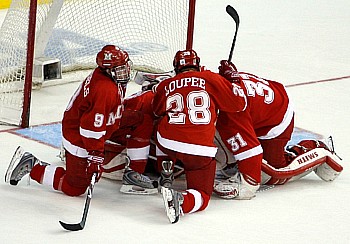
The RedHawks were a minute away from a national championship. They were an overtime goal away from a national championship.
Still, they walked out of Verizon Center on Saturday as runners-up.
It all ended when Roeder, an alternate captain in his 152nd and final game with the RedHawks, did exactly what he should have done.
When Cohen wound up on the left side, Roeder went into a slide to block the shot. He did, but the puck deflected off him and floated into the net.
It had to be a one-in-a-thousand bounce.
“See what happens the next time,” Roeder said. “I don’t think that’s going to go in. It’s a fluke, and that’s the game of hockey. That’s overtime.”
Roeder had no qualms about going down for the block, even with the outcome.
“Ten times out of 10 times, I’m going to go down and block that shot,” Roeder said. “That’s part of hockey. You’re going to block shots, sacrifice your body. In overtime, you learn to put anything on net. That’s what he did, and he had a great outcome.
“It’s a hard outcome. I didn’t understand how the puck went in in the first place until I watched the replay. Watching that replay hurt a little bit, but you’ve got to understand it’s hockey.”
In a regulation finish fitting for the wacky 2009 tournament, the Terriers scored a pair of goals with an extra attacker in the final minute to force overtime.
On the first one, Miami defenseman Cameron Schilling appeared to have a chance to clear the puck away from the net but lost the puck. Zach Cohen backhanded a sharp-angle shot off Reichard’s right pad and in with 59.5 seconds left.
BU equalized when defenseman Matt Gilroy pulled the puck around a Miami player and set up Nick Bonino for a one-timer with 17.4 seconds left.
“I can tell you we had the right guys on the ice,” Blasi said. “We knew exactly what they were going to do. We were trying to keep our guys focused. They [the Terriers] executed.”
The RedHawks didn’t allow a power-play goal on two BU attempts Saturday, but the Terriers made the most of their 6-on-5 time.
“If you have that puck on your stick, you want to get it off and out of the zone,” said Roeder. “We had opportunities to do that and we didn’t and they took advantage of that. That’s how they got their two goals. It’s a bummer. It’s a hard pill to swallow right now.”
Meeting with the media, Blasi took a long pause before starting to respond to a question about how this feeling compared to that of last season, when the RedHawks lost in overtime to Boston College in the regional final.
That night, Miami had a 2-0 lead in the second period and could start getting a taste of the Frozen Four.
“I would say that it’s worse, obviously,” Blasi said before another long pause.
“And this senior class has won more games, I believe, than any other program in the country in the last four years. I would say that’s pretty damn good.
“And I’m proud of the way they played tonight. We didn’t get the bounce at the end. But in my books, and I know in a lot of hearts around campus and alums and supporters, they’re national champions.”
BU-Miami Notebook
Secret Revealed
All season long, Boston University sported t-shirts bearing the phrase “Burn the Boats.” The team swore itself to utter secrecy, only promising to divulge the meaning and origin of the slogan after the season ended.
Well, the season ended, all right.
“Coach (Jack Parker) read us a story at the beginning of the year about (Spanish conquistador Hernan) Cortez,” explained captain and Hobey Baker-winning defenseman Matt Gilroy. “and about how after the battle, they were going to take the other guys’ ships home.
“That was our mentality all year. It doesn’t matter who we play; we’re a team and we were going to burn the boats out there every night that we’re out there.”
The Terriers’ familiarity with the phrase was spawned of a preseason conversation between Parker and former assistant coach, and U.S. Women’s National Team head coach, Ben Smith. Both coaches clearly found it inspirational, but the punch line, as it were, was something Parker saw coming.
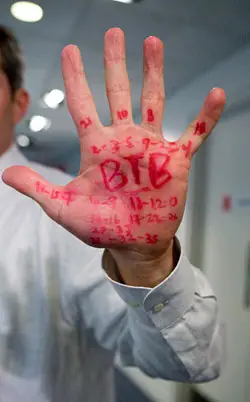
“Well Ben was telling me the story, he said, ‘and then Cortez gave one order,’ and I said, ‘burn the boats’. And he was kind of, ‘Geez, how’d you know that?’ Because I watched Hunt for Red October about a week before that, and Sean Connery (told that story in the film.”
Senior Showdown
The championship game pitted two of the country’s most successful senior classes head-to-head, as D-I’s best, Miami (106-43-14 entering the game), took on a close-running BU class that finished 100-43-21.
Oddly enough, only four seniors registered points, four assists, of the 19 total tabulated.
Alumni at the Helm
Saturday’s tilt also matched two head coaches who led their alma maters to the final game. The last time that happened was relatively recently, as Mike Eaves strategized Wisconsin past Jerry York and Boston College in the 2006 finale.
Of 25 current alumni coaches, only York, Parker, Eaves, and Red Berenson at Michigan have won national championships.
Change of Plans?
If future organizers plan on hosting another public skating session on competition ice, perhaps they’ll schedule it on the off day, or at least more than four hours before game time.
The open skate took place between 1 and 3pm on Saturday, and with so many fans eager to partake, there were no ice-resurfacing breaks during the event. It’s not much of a stretch to presume that the mauling incurred by the ice by the skate’s end was partly responsible for the frequent slips and funny bounces observed early in the title game.
Not Exactly According to Plan
Steve Cady, chairman of the 2009 NCAA Selection Committee, is also widely regarded as the father of Miami hockey. Cady served as the RedHawks’ first head coach in 1978-79 and functioned in such a capacity for seven seasons. Now the school’s senior associate athletic director, the program’s three-year-old hockey arena is named in Cady’s honor.
It was probably not Cady’s happiest moment then, when he found himself presenting the trophy to Boston University, when his beloved RedHawks had been so close to putting a bow on his marvelous Frozen Four.
Preemptive Insult
The media workspace was set up on the Washington Wizards’ practice court, which comes complete with a basketball scoreboard, among other things.
The board was put to good use all tournament, as the clock monitored the teams, score, and time remaining on the clock for journalists who happened to be stuck in the workroom instead of in the press box.
However, the media found a slight error as they walked down to the working floor: the clock ticked down to game time, and “Boston” was listed on the left above the first zero.
On the right-hand side?
“Maimi.”
Charmed, I’m Sure
All year long, BU demonstrated ability, determination, and chemistry that put them in the nation’s upper echelon, but even when the Terriers’ talents or drive weren’t good enough to win the day, there always seemed to be a little something extra on the Dogs’ shoulder.
“We got a lot of bounces,” confirmed Parker. “We got a lot of bounces in this tournament, we got a lot in the Hockey East tournament, we got bounces in big games all year.”
Parker wasn’t exactly willing to hand his position over to the Fates, however.
“We talk about, ‘Winners don’t count on breaks, they make breaks count,'” he said.
BU’s breaks? Counted.
And With That. . .
-The Terriers set a new program record for most wins in a season with 35. The mark also tied Michigan’s 1996-97 achievement, but set a new high for wins by a title-game team since Maine went 42-1-2 in winning the 1993 crown. The Black Bears’ only loss that year? BU.
-Parker became the first Division I coach in history to earn 30 NCAA Tournament victories, passing crosstown rival and contemporary Jerry York of Boston College, who has 29.
-Boston University finished the season on a 19-game unbeaten streak away from home (17-0-2), the longest such tear in program history. Goaltender Kieran Millan was 16-0-1 away from Agganis Arena this season.
-BU finished the season undefeated against non-conference opponents. The only non-conference game the Terriers lost was in the Hockey East quarterfinals, a Game 2 defeat at the hands of Maine.
-No team finished the year with a winning record against the canines of Commonwealth Avenue. Vermont won the regular-season series by a 2-1-0 count, but the national semifinal result drew the schools even.
-The Dogs are now 5-5 all-time in title games.
Quotables
-It wasn’t meant to be.” – Miami sophomore Tommy Wingels and head coach Enrico Blasi, within moments of each other in the postgame press conference.
“I can’t believe you have a BC tie on, for starters.” – Parker, to conference moderator Erich Bacher. Bacher, Sports Information Director at the University of Denver, promptly pointed out that the Pioneers also sport maroon and gold.
“This is the greatest comeback I’ve ever been involved in.” – Parker, who added that the similar last-minute two-goal-comeback in 1991 against Northern Michigan was second place, since the Terriers ultimately lost that contest in triple-overtime.
“Colby, you closed your eyes.” – Gilroy, interrupting game-winning-goal-scorer Colby Cohen’s explanation of how the shot found the net.
“You might have to prop me up like Bernie, or whoever that was.” – Parker, on how he’ll coach BU to its next title in his fifth decade behind the bench.
Most Outstanding Player: Colby Cohen
On a team with this year’s Hobey Baker winner Matt Gilroy and another Hobey finalist, Colin Wilson, Boston University sophomore defenseman Colby Cohen seemed an unlikely candidate to score a game-winning goal for a national championship.
In his first season last year, Cohen had three goals and 13 assists, putting him 10th among BU’s scorers. This year, Cohen netted eight goals, including the championship-winner on a deflected shot at 11:47 in overtime, and had 24 assists as the Terriers’ seventh-highest scorer and the second-highest scoring defenseman in Hockey East, behind Gilroy.
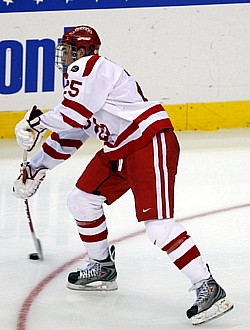
So while the finish of tonight’s championship game contained several surprises, the fact that Cohen found the net to end the game may have been among the least of them.
BU coach Jack Parker said that anybody who paid attention to the Terriers this season could have seen Cohen perform the same trick, minus the securing of a national title, in any given night.
“The reason he got the game-winning goal,” said Parker, “is [because] he’s a terrific offensive defenseman who can shoot the puck 100 miles an hour.
“The reason we recruited him [was because] he was a great power-play guy, not only because he can move the puck and get great plays, but he’s got a cannon, and that’s what he brings. When we’re recruiting guys, we like to see something special. What we like about this guy, what makes him special….[is that] he’s such a great offensive defenseman, especially with the shot.”
Cohen’s goal was the only point he scored this weekend, but not for lack of trying. Cohen hit the pipe in the second period of the Terriers’ 5-4 semifinal win Thursday, hit the pipe again tonight in the middle stanza, and attempted four shots total in the game.
“I’m getting close to scoring some goals this weekend and I’ve been hitting a couple of bars,” said Cohen. “I just let it go and I saw it get blocked and go up and over the goalie’s glove.
“I saw it go in and that was it. I don’t remember anything after that. Just an unbelievable feeling.”
When pressed, Cohen said that he tried to make a move around Miami defenseman Kevin Roeder on the game-winner, but he was interrupted by Gilroy.
“Colby, you closed your eyes,” joked Gilroy.
“And then I closed my eyes and shot it, and here we are right now,” replied Cohen.
Cohen, a native of Villanove, Pa., was a member of the U.S. National Development Program before playing for the Lincoln Stars (USHL). In 2005-06, Cohen was a member of a U.S. Under-17 squad that won a silver medal.
Cohen was drafted by the Colorado Avalanche in the second round of the 2007 NHL Entry Draft, 45th overall.
Cohen was productive on both sides of the puck this weekend, blocking shots in both tournament games. His outright stick save in the first period against Vermont, with the puck rolling up and over goaltender Kieran Millan, who was positioned at the outer edge of the crease, created the transition that led to a goal moments later, putting BU up 2-0.
Of his goal Cohen said, “I got lucky, I guess,” but his coach wasn’t buying that.
“I don’t think anybody, if they’ve watched us, they know enough of Colby Cohen,” said Parker.
BU’s Matt Gilroy Wins 2009 Hobey Baker Award
At this point, there’s just one thing left for Matt Gilroy to accomplish, and he’ll have that opportunity Saturday night.
Gilroy, a senior defenseman for Boston University, was named the 2009 Hobey Baker Memorial Award winner Friday night at the Verizon Center, beating out Northeastern’s Brad Thiessen and teammate Colin Wilson.
In a season that has seen the Terriers capture almost every tournament and honor in sight, Gilroy has seemed prescient in turning down a pro contract after his junior season to return for one more year with Boston University, especially after a junior year that saw the Terriers struggle and fail to make the postseason.
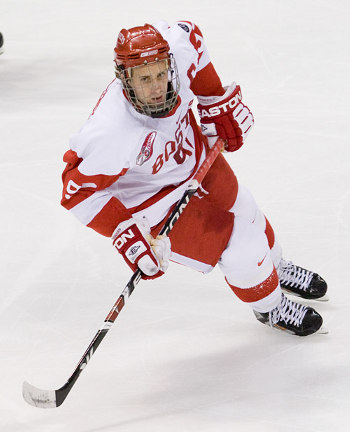
“I think the disappointment (from last season) was part of the reason to come back,” said Gilroy. “Having a chance to stay, be the captain, play with my brother, Colin came back, it’s been a really fun ride.”
Gilroy certainly has the numbers to back it up. Gilroy scored 36 points this season, leading all Hockey East defensemen in scoring.
Besides his productivity on the blue line, Gilroy was named to the All-Tournament Team and Tournament MVP at the Denver Cup, the All Tournament Team at the Hockey East Tournament, and the All Tournament Team at the Northeast Regional.
Gilroy also was the first defenseman to be named a First Team Hockey East all-star three years, and was named a first team All-American, his third All-American selection.
This season marked the first time that the Hobey “Hat Trick” finalists all came from the same conference, and only the second time that two players from the same team were named to the final three. Wilson and Gilroy were both quick to praise each other in the post-ceremony press conference.
“We were wishing each other luck before,” said Wilson. “We said we had to make sure to mention the other in the speech if we won.”
“Look at our team,” added Gilroy. “If not for him and the rest of the team, I wouldn’t have been there. Everyone is having the best year of their career.”
Gilroy became the second Terrier to win the award; Chris Drury took the honor in 1998.
Gilroy, who grew up in North Bellmore, N.Y., and originally played forward, transitioned to defense as part of his move to college hockey. Gilroy thought his career was over after juniors, as he was passed over by every Division I program in the country, and started his career at BU as a walk-on.
The presentation ceremony itself was a light-hearted affair. Gilroy and Wilson started the evening in one penalty box, with Thiessen in the other, and came out after their names were announced.
Wilson and Gilroy joked about nerves beforehand with their Terriers teammates in the stands to cheer them on. The Terriers pep band was in the stands and played an interesting array of rock tunes during the commercial breaks, including Green Day’s “Holiday.”
Wilson’s mom got laughs from the crowd while talking about being a goalie for one-year old Colin in her PJs, and both mentioned Colin’s father Carey, who is back home in Winnipeg worrying about the possible flooding of the Red River, where the family’s home is located.
Thiessen found himself in the unusual position of winning his conference’s Player of the Year Award and then losing out the Hobey Baker award to another player in the conference. Gilroy’s contributions in the NCAA regionals may have boosted him over Thiessen, whose team had a great season end in bitter disappointment with a first-round exit to Cornell.
Asked to put winning the award in the context of what has been a dream season for the Terriers, Gilroy was quick to point out that it’s not a dream season yet.
“Ask me that after Saturday,” he said.
Just one more accomplishment to go.
No, Not That Miami…
When Bemidji State emerged from the Midwest Regional after downing Notre Dame and Cornell, the Beavers became instant media darlings and the unofficial new favorite team of everyone whose true love wasn’t playing in D.C. this weekend. The George Mason basketball pep band even adopted them for the Frozen Four when BSU didn’t have the travel budget to bring its own band – a good fit, since Beaver head coach Tom Serratore evoked the spirit of George Mason’s 2006 Final Four run post-game in Grand Rapids.
But Bemidji wasn’t the only upset team to win its way to the Frozen Four for the first time this year, and after the Miami RedHawks dispensed of the Beavers in Thursday’s early semifinal, it seemed as though the press corps was stumped regarding the team whose home is in southwest Ohio.
Said one reporter, “We’ve heard a lot of questions about where is Bemidji. A lot of non-hockey people – ”
“Where is Oxford, Ohio?” asked Miami head coach Enrico Blasi, anticipating the enormous need of the assembled to process information that should not – by any stretch of the imagination – be new.
“It’s not in Florida, right?” said the reporter.
“It certainly is not in Florida,” Blasi said.
To be precise, Oxford is at latitude 39? 30? N, longitude 84? 45? W. In other words, 774 miles as the crow flies from Boston, a 40-minute drive north of Cincinnati, Ohio – which borders Kentucky – and about six miles east of the Indiana border. Oxford is roughly a 120-mile drive to the Ohio state capital and home of the Buckeyes, Columbus, but it’s closer to Louisville, Ky. (138 miles) than it is to Miami’s other Ohio CCHA rival, Bowling Green (178 miles).
So on Thursday when a reporter asked Boston University head coach Jack Parker what he knew about Miami and Parker joked, “I know it’s warmer there,” he spoke more truth than he realized.
As the RedHawks are playing for the first national championship of any sport in Miami University history – and it is Miami University, not Miami of Ohio – this trip to the Frozen Four is every bit as unique for Miami as it was for Bemidji, maybe more so.
“Right now,” said Blasi, “for our program, I hope that our community, our student body, our alumni, former coaches, everybody associated with the program are enjoying the journey.”
I’m not associated with the program, but as someone who has covered Miami hockey since 1995 – for many years from a very close 120 miles until I moved last year from Columbus to Michigan – I know that I’m enjoying the journey.
I’m also enjoying the confusion of my colleagues.
And the Hobey goes to…
Matt Gilroy.
You’ll note by the way, that I didn’t say, “And the winner is…” Brad Thiessen and Colin Wilson are certainly winners, too, in their own right – thanks, Oscar – but this is certainly one of the special stories I’ve had the privlege of covering in my time as part of the college hockey community, and listening to Matt give the Hobey Baker speech helped drive that home.
With apologies to Matt Carle and Ryan Duncan, I don’t remember much about their Hobey Baker speeches, and sadly, I wasn’t in Denver last year to hear Kevin Porter give his speech. However, it certainly struck me the way that he thanked his teammates, not just in the obligatory way, but to single out his co-captain John McCarthy for helping him lead the team, his brother Kevin Gilroy for joining him on at BU this season, and his defensive partner Brian Strait for “cleaning up” after him.
The individual thank-yous to the coaching staff are also something I don’t necessarily remember hearing in the past, and it reminds me of the role coaches have in stories like this: finding the diamond in the rough who might turn into something. Former Hobey Baker finalist John Curry often credited the BU coaching staff, particularly goalie coach Mike Geragosian, for helping him adjust his technique and become the goalie that we spent so much time talking about in recent years, and Gilroy certainly isn’t shy about mentioning the similar role that Mike Bavis and David Quinn had in helping him adjust to playing on the blueline. The trophy went to Gilroy, but this was certainly a win for the entire BU program, and Gilroy wasn’t afraid to say so.
It was also a win for the Gilroy family. Hearing him thank his parents and remind them how much of their money he spent as a walk-on was amusing, and a reminder of one of the important parts of this story: that Gilroy’s journey had humble beginnings. Of course, there’s also the matter of Jack Parker having given away Gilroy’s scholarship before this season, costing the family a bit more money – “My first reaction was that I was not too happy,” Gilroy said – but since the 2009 Hobey winner is now too old to be bound by the NHL’s entry-level contract system, he should be able to settle up with his parents when the ink dries on that pro contract in the near future.
Also, there’s the spirit of Matt’s brother Tim, whom Matt has honored throughout his hockey career, and it was clear as Matt spoke about the highlights of his BU career in the post-ceremony press conference, just how important that’s been, right up to this moment.
“I think one of the best things that I’ll always remember is my first game,” Gilroy said. “I walked into the locker room, and if you’re playing that night, your jersey’s hanging in your stall, and that’s the first thing I did that night and every night I walk into the locker room, is I look at my stall, because I remember that feeling, seeing that jersey, and seeing that number that I wear in honor of my brother. I get goosebumps every time I walk in the locker room, and I think that’s something I’ll always remember.”
Of course, as time goes on, I’m sure this is a night that Gilroy will always remember as well, and I’m pretty sure I’ll remember being here in Washington to see it.
Meanwhile, kudos go to ESPN and the Hobey committee for doing a great job on the ceremony this year. The video tribute to Hobey Baker was very well done, and I thought bringing in former winners George McPhee (the Capitals’ GM and vice president) and Tom Kurvers (assistant GM with the Lightning) was a great touch. Also, the BU band sounded great during the commercial breaks. I never covered a Frozen Four before they started having this Friday night event that included the Hobey presentation, but I think it’s really a fun evening, and this year’s, with this Hobey ceremony, was particularly memorable.
Oh, and just one last thought:
Do you think that somewhere, in the back of his mind, it tweaks Jack Parker just a little bit that both players who have won the Hobey at BU are Yankees fans?
Goodnight from the Verizon Center!